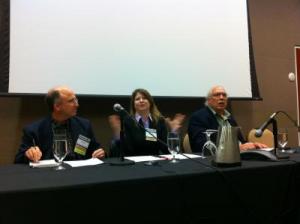By Boonsri Dickinson
Ah, the allure of not having to go to roll out of bed and rush to the 9 to 5 job staff job. That’s the life of a freelancer. But the freedom, of course, has its drawbacks: Paychecks are uncertain and you’re on your own to pay for health benefits.
Many in the audience attending “1001 Questions about Freelancing“ session at the National Association of Science Writers 2011 conference in Flagstaff, were full-timers flirting with the idea of going freelance. The others in the room were already freelancing. Like me, they were there to find out some tips and see how other freelancers were spending their time.
Freelancer Steve Miller hosted the freelancing panel on Saturday morning. Anne Bolen, managing editor of National Wildlife, and Dan Ferber, freelancer and co-author of Changing Planet, Changing Health, joined him. Rajendrani Mukhopadhyay, a freelance writer and editor, couldn’t make it, so she chimed in remotely.The conversation was question-driven, so the discussion jumped from topic to topic. Each panelist brought different experiences to the table. For instance, Ferber has been a freelancer all his life. He got a Ph.D. in biochemistry and did a post doc in microbiology. Then he went to journalism school at the University of Illinois. He started freelancing in journalism school. Thoughout his career, he has gone in a lot of directions over the years. He has written news for Science and has written features for Popular Science. His latest project is a book.
“I am always trying to become a better reporter and better writer. I’m always trying new things. Most of us in this room are novelty seekers,” Ferber said.
“In one case, I was writing some feature stories for Popular Science. Then an editor left and went to Women’s Health. I had a contact at Women’s Health, so I wrote for Women’s Health. The point is editors move around. Build good relationships with editors,” he added.
I asked about health insurance and how much the panelists are making.
Most of the panelists said they use their spouses’ health insurance plans. So their advice was to get married (half jokingly). Or use www.ehealthinsurance.com or a broker.
“As for having a salary base in mind, you should have a financial goal. Try to have a number there. And don’t freak out if you don’t meet it for one month,” Mukhopadhyay said.
Miller says he shoots to make $100,000 a year. He sees it as the equivalent of having a staff job, where you’d make $65,000 to $70,000 in salary.
Ferber works 60 hours a week on average. But it depends on what’s on his plate, he said.
“You’ll have way more ideas than you have the time to do. Try to have a few pitches circulating,” Ferber said. He prefers writing ideas down in a physical bound notebook to make it feel more real.

